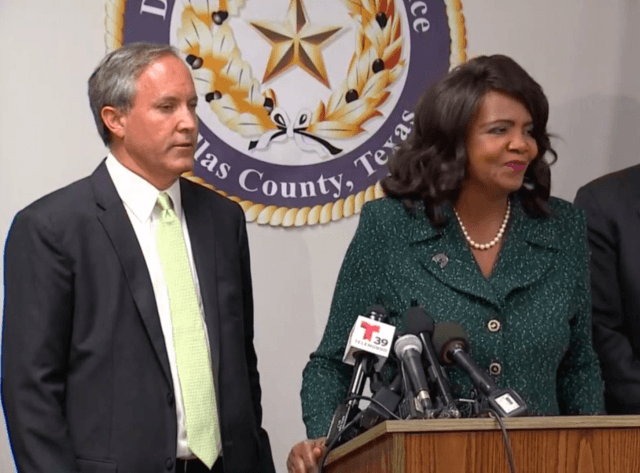With a primary election a few weeks away, Dallas County officials say they already received suspicious mail-in ballots, triggering election integrity vigilance in the wake of last year’s voter fraud scandal engulfing two city council races. It led to hundreds of sequestered ballots, one arrest, and a state law to squash such illegal activity.
Dallas County Elections Administrator Toni Pippins-Poole acknowledged her office recently turned over a small number of potentially fraudulent absentee ballots for the March 6 primary to the county’s district attorney because the voters said they did not request them. On Wednesday, she told KDFW: “When we see mail ballots come back, and we just got the application in that same month, and the ballot comes back as addressee unknown, we’re turning those over to the district attorney’s office.”
Pippins-Poole said the Dallas County Elections Department is reviewing absentee ballot applications to check for foul play like dead voters or unlawful assistance. She cautions Dallasites not to turn over mail-in ballots to strangers who show up at their homes and claim to offer help in filling out the paperwork. “If you don’t know that person, don’t allow it.”
Last year, the elections department sequestered roughly 700 suspicious absentee ballots, which temporarily halted the results of a May election fraught with allegations of forged ballot signatures in two hotly contested Democrat Dallas City Council races. The district attorney’s office later launched an investigation and asked the Texas Attorney General for support, which was granted.
Breitbart Texas reported that, in June, the Dallas County District Attorney’s Office issued an arrest warrant for Miguel Hernandez, the prime suspect accused of forging signatures on the mail-in ballots of unsuspecting elderly voters under the fictitious name “Jose Rodriguez.” However, he skipped town. Weeks later, a Dallas County grand jury indicted him in absentia on charges of illegal voting. Police then located and arrested Hernandez, setting his bail at $100,000. According to KDFW, Hernandez is free on bond.
Pippins-Poole called what happened “very shocking” when they saw “the same name come up on all these applications.” She said: “The law says this person would have to have a name and address. The name did not exist nor did the address. That’s where it was real shocking, we’d never had that before.”
Absentee ballots are used, mainly, by voters age 65 and older, the disabled, and people out of the country.
Pippins-Poole noted her office made some changes since last year like advising registered voters to mail in their own absentee ballots. This week, the district attorney will ask a judge for permission to pull suspicious March primary mail-in ballots for further review, according to KDFW.
The Dallas County mail-in ballot debacle also resulted in a statewide legislative fix, Senate Bill 5. Now, penalties for voter by mail fraud graduate for repeat offenders from misdemeanor to felony status. The latter carries a sentence of two to 10 years in prison and up to a $10,000 fine. The law prohibits the use of an electronic signature and requires signature verification for absentee ballots. Rejected mail-in ballots suspected of fraud must be reported promptly to the Texas Attorney General’s office.
Breitbart Texas reported the Public Interest Legal Foundation (PILF), a national election integrity law firm, called SB 5’s stronger penalties a positive step but argued that Texas needed better voter identification requirements built into the mail balloting system. PILF cites the Kansas model, which requires citizens to provide driver’s license numbers or other similar forms of identification when requesting a ballot by mail.
In January, the Dallas County Commissioners Court voted to limit the number of pre-printed mail-in ballots individuals may obtain from the elections department to alleviate fraud. However, some experts said this does little to curtail voter fraud as it does not stop people from printing up mail-in ballot applications from the county’s website, as Breitbart Texas reported. PILF called the ballot by mail limits “a joke” and said that officials were not “serious about a problem disproportionately impacting minority voters.”
Direct Action Texas, a Dallas-Fort Worth political advocacy group, concurred. Director Aaron Harris dubbed the commissioners’ vote “smoke and mirrors” because the self-printing policy was in place last year when the voter fraud occurred. This watchdog group uncovered alleged mail-in ballot voter irregularities in Tarrant County during the 2016 general election which resulted in the largest voter fraud investigation in Texas history.
Breitbart Texas also reported on voter fraud issues in Nueces, Starr, Bexar, and Harris counties. PILF accused officials in Bexar and Harris counties of “concealing” voter registration records belonging to ineligible noncitizens. The group argues that the National Voter Registration Act allows them public inspection rights for voter maintenance records. Both counties now face potential federal lawsuits this year if they do not comply with the watchdog’s requests.
In March, Texans will cast primary votes for state and local races including governor, lieutenant governor, state legislature, plus railroad, land, and county commissioners. Thirty-six U.S. House seats and one Senate race will appear on the ballot.
Follow Merrill Hope, a member of the original Breitbart Texas team, on Twitter.

COMMENTS
Please let us know if you're having issues with commenting.